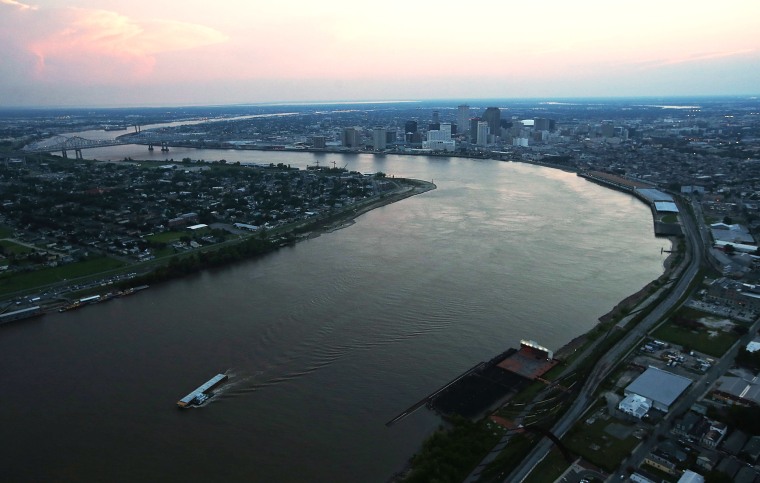The steady push of salt water upstream in the drought-hit Mississippi River could have serious health and economic consequences across southern Louisiana, where many communities rely on the river for drinking water, irrigation and shipping.
Persistent drought in the region has dropped water levels in the Mississippi River to near-historic lows, allowing salt water from the Gulf of Mexico to creep upriver and much farther inland than normal.
Drinking water across most of the state is still considered safe at the moment, but it’s projected that salt water could reach water intake facilities in Belle Chasse by Oct. 13, St. Bernard by around Oct. 19 and facilities in New Orleans later in October. In Plaquemines Parish, south of New Orleans, residents have already been relying on bottled water since the summer after the area's water system became inundated.
President Joe Biden on Wednesday declared the unfolding saltwater intrusion a federal emergency, freeing up funds to support state and local relief efforts. The U.S. Army Corps of Engineers was working this week to expand an underwater barrier to help delay the seawater’s movement upstream, but officials say they expect the “sill” to be overtopped again in the coming weeks.
The health impacts from excess salinity in drinking water are top of mind for those in southeastern Louisiana, but experts say saltwater intrusion can also endanger crops, animal stock and infrastructure in the region.
Salt in the drinking water supply is a major concern because it can cause sodium to spike to unsafe levels in the human body, which increases blood pressure.
Stephen Murphy, an assistant professor at Tulane University’s School of Public Health and Tropical Medicine, said those most at risk are infants, pregnant women and people who already need to closely monitor their sodium intake.
“Members of the population who are on no-salt or low-salt diets will be susceptible because those individuals need to be extremely careful about high blood pressure,” he said.
Officials in Louisiana said millions of gallons of water are being barged in to dilute local water supplies, if needed, and reverse osmosis equipment may also be used at some treatment facilities.
Gov. John Bel Edwards said the Louisiana Department of Health will work with parish officials to test municipal drinking water and issue public health guidance.
Murphy said people can prepare by stocking up on bottled water, but added that there’s no reason to panic.
“Just like we would during hurricane season, go out and buy what you need and maybe a little more in case something goes wrong,” he said. “But you don’t need to go out and buy every pallet of water you can find.”
Still, saltwater intrusion can have other serious effects on people and animals, particularly because of its corrosive nature.
There are concerns, for instance, that seawater could corrode pipes and leach heavy metals into the water supply, said Holly Michael, a hydrogeologist at the University of Delaware and director of the Delaware Environmental Institute.
“If you introduce water with different chemistry into a water distribution system, that can create all sorts of problems,” she said. “Depending on what pipes are made of, saltwater intrusion could release heavy metals, it could change the chemistry in water treatment, it could corrode appliances in people’s homes.”
Agriculture in the region will likely be affected by salt water creeping upstream, particularly farmers who rely on river water for irrigation. Michael’s own research in Delaware found that saltwater intrusion often caused farmers to unknowingly irrigate their fields with saltier-than-normal water, causing crops to die.
Low water levels in the Mississippi River, a key shipping corridor, could also affect commercial operations, exacerbating existing issues from lingering drought conditions.
Michael said the developing situation highlights how climate change and drought are affecting people’s lives and livelihoods — and how far-reaching the consequences can be.
“It’s important that people understand how fragile our systems are, especially at the coast,” she said. “We need to really think about what we’re doing to our systems and also how they’re responding to change, and then be proactive about understanding how that might affect our lives and infrastructure.”

